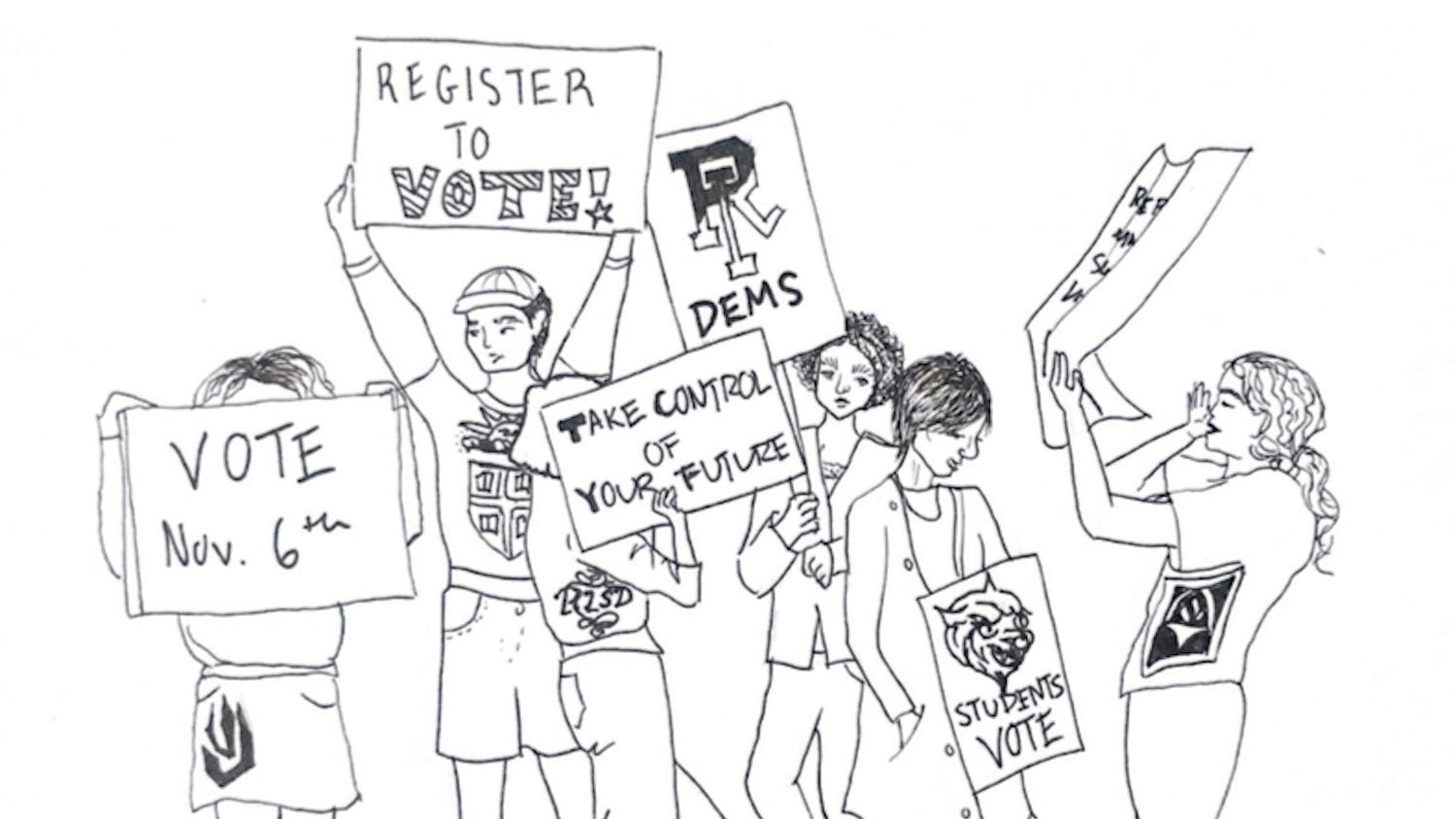The Rhode Island School of Design may become the third school in the city to grant officers arresting powers — but some RISD students, who fear that officers could use their new powers to arrest underage drinkers, do not want to see that happen.
Brown and Rhode Island College are the only two universities in Providence employing campus officers with the power to arrest.
A bill under consideration by the Rhode Island General Assembly would recognize RISD officers as peace officers, RISD spokesperson Jamie Marland said. Peace officer status would give campus officers, who are presently not state-sanctioned, the power to search, detain and arrest individuals suspected of illegal activity.
‘Slightly disconcerting'
Several RISD students expressed concern that campus officers would use their arresting powers inappropriately, especially to discipline underage partygoers.
"RISD police officers gaining the power of arrest is slightly disconcerting to me," said Elizabeth Soucy '13, a Brown-RISD dual degree candidate.
Soucy said student sentiment toward the campus public safety department at RISD is different from the attitude at Brown, mostly due to the design school's stricter enforcement of underage drinking policies. As a result, Soucy said, she thought RISD police officers could be more likely to arrest students than Brown officers.
Brown's Department of Public Safety's reputation of leniency "promotes the ultimate safety of the students," Soucy said, making them feel more comfortable calling the police when in trouble — especially if the situation involves underage drinking.
Ayo Ouditt, a RISD freshman, agreed that granting RISD officers arresting powers is excessive, and may only lead to "unnecessary" arrests of students who are drinking underage.
In "extreme" cases of alcohol abuse where intervention is necessary, the administration already has a disciplinary system in place, Ouditt said. Those students face, for instance, suspension or expulsion, which are more appropriate penalties than arrest, he said.
Though there have been cases of expulsion due to alcohol abuse, "excessive drinking isn't a problem here," said Brenden Cicoria, a RISD freshman. He added that RISD students often go to Brown to drink because Brown is known for its mild enforcement of drinking policies.
Brown police officers made no arrests for liquor law or weapons violations and only one arrest for drug violations in 2008, according to the Department of Public Safety's crime report. No such arrests were made in 2007 or 2006, the report said.
But in 2008, officers issued a total of 65 disciplinary referrals for potential weapons, drug and alcohol violations on campus: 8 for weapons violations, 29 for drug violations and 28 for alcohol violations, according to the report. The number of referrals for alcohol violations was 64 in 2007 and 80 in 2006, the report said.
Students who receive a disciplinary referral involving alcohol are required to "undergo appropriate alcohol education, evaluation, and/or treatment as determined by appropriate officials," according to the University's Judicial Affairs Web site.
Sarah Harrison '12, a Brown-RISD student, hypothesized that the design school might be stricter in enforcing alcohol policies to create the atmosphere of a "serious" school.
"I've always suspected that RISD's extreme self-consciousness in terms of its image has trickled into its enforcement of rules — but RISD's desire to be taken seriously as an institution doesn't really need to make itself present in the relationship between Public Safety and the students," Harrison wrote in an e-mail to The Herald.
RISD officers might act more like their Brown counterparts if they gain arresting powers — or they might go on a power trip, according to Harrison.
"It's kind of complicated. I don't know whether RISD tells Public Safety to be strict in their enforcement of school rules, or whether they enjoy enforcing rules, or both," Harrison wrote. "If they had more power, would they feel less the need to assert it whenever opportunity struck or become more overzealous in their enjoyment of enforcing RISD's rules?"
Ultimately Harrison, who was written up by a RISD officer last year, wrote that she would feel less safe if the peace officer bill is passed.
When Harrison lived in a RISD residence hall located above the Public Safety office last year, "there was an atmosphere of stress" due to the possibility of being approached by an officer, she wrote. "Living at Brown has been much less stressful in this respect because I worry less about getting into trouble, despite the fact that Brown officers do have the power to arrest."
Though Harrison enjoys the relatively lax enforcement of laws at Brown, she finds it somewhat unsettling. "Of course, the fact that Brown feels like kind of a legal playground in the middle of a troubled city is disturbing in its own right," she wrote.
Ouditt said he would have supported the bill if Providence were unsafe, which he feels is not the case.
"If I thought crime was a problem at RISD, it would be a different story, but it's not," Ouditt said. "People say Providence is dangerous, but I would sleep on the street here."
Crime, including incidents like the massacre at Virginia Tech, is always a possibility, but those events are "extreme outliers," Cicoria said.
Police presence at Brown
Though students at Brown said there were benefits to having state-sanctioned police on campus, some said it was not necessary for their sense of security on campus.
It is mostly "their presence that counts, not that they have the power to arrest," said Jeffrey Blum '12.
Ben Jones '13 said he has walked alone at night on campus and has never felt unsafe — but not because of the presence of DPS officers.
"I've walked alone in the dark and I've never found myself thinking, ‘I'm glad there are police officers around,' " Jones said.
"That said," he continued, "I've read the crime reports, and I know bad things do happen. In that respect, it's good that Brown can take care of these things internally."
Chief of Police and Director of Public Safety Mark Porter did not respond to requests for comment.
Different takes
Campus officers are not taken seriously, said Elizabeth Hernendez, a senior at Johnson and Wales University. "They look very young — some of them are college students — so no one takes them seriously."
Some of the officers actually are students at JWU, said Sarah Bardwell, who graduated last year. "We have a criminal justice department here that offers credit to students for being public safety officers. They do it as an internship."
Campus officers at JWU have no power "whatsoever" to enforce laws or university rules, Hernendez said. "I feel bad for them sometimes, especially when they try to (tame) drunken parties. Students are constantly mouthing off to them. They're treated like a joke around here."
Herndenez said she was on the fence about the necessity of a "real police" presence on her campus. "If campus officers had the power of arrest, they would certainly get more respect than they do now. But with Providence police nearby, I'm not sure if we need real police officers on campus."
Students at the University of Rhode Island — whose officers are state-sanctioned and thus can arrest — argue that campus officers can do their job better with arresting powers.
"Problems on campus are not always about drinking," said Renee Lemieux, a URI freshman. "There is occasionally domestic violence that goes on too, which is one example of a case in which the officers should have the power to arrest."
Othe
r URI students said the integration of their campus with the general community calls for increased security.
"Our quad is basically a park for anyone to visit," said Sheena Murray, a freshman at URI. "I feel like it might make a difference if a campus is closed, since you might not have as much of that outside force coming in to threaten the security of the school."
URI officers have the responsibility to ensure the safety of students on a campus that lacks fences to "keep other Rhode Islanders off university grounds," Eli Roth, a URI junior, wrote in an e-mail to The Herald.
"Depriving our enforcement officials their chief tool of enforcement would be a mistake," Roth wrote. "If we want police officers to do their job, it is only natural to arm them with the tools of their trade. This comes with the essential caveat that it would be wrong — and indeed, unconstitutional — to see students arrested for breaking university rules, as opposed to state or federal law."
ADVERTISEMENT




